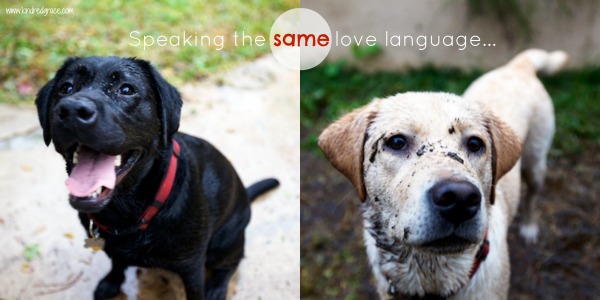The Universal Love Language
During a two week stint of house-sitting last month, my husband and I became well acquainted with our fellow occupants, Hana and Maile, a rambunctious pair of Labrador Retrievers. I enjoy dogs and, for the most part, they like me, but after fourteen days with those two (pictured above), I discovered we have very different ideas about expressing affection. It dawned on me one morning as Maile was breathing loudly in my general direction as she waited for me to get out of bed, that my interaction with these dogs was the perfect example of differing love languages.
I like to pat them on the head, tweak at their soft ears, and rub a sock foot across their back as they lay quietly by the sofa. Hana and Maile, on the other hand, are exuberant lickers, excited sneezers, and effusive tail waggers. The thought behind my actions may be the same as theirs, but they are sure communicated in contrasting ways. Living in the tension of these differences for two weeks reminded me that speaking someone’s love language is a important, might I say necessary, element in maintaining healthy relationships.
Recognizing Versus Feeling The Love
I know what it means when dogs wag their tail or jump up for some solid face licking. I recognize they mean to express affection, but I don’t feel loved; I feel like I need to wash my hands. I can’t speak for a dog’s level of love intelligence, but I think they operate in the same way. Hana and Maile may recognize my aforementioned subtle expressions as affection, however, those actions are very much on my terms. If I wanted to really make them feel loved I would play tug-of-war, let them lick, and scratch their belly.
It’s generally easy to recognize when someone does something nice for you — gives you a just-because gift, pats you on the back, or says some kind words — but it may not hit the love sweet spot. The love sweet spot is when you feel the love motivating someone’s actions. It’s easiest to feel that when someone expresses their affection the way you were wired to receive love. My husband is a physical touch kind of guy, which is not my natural love go-to. For him, a hug first thing when he walks in the door is more loving than having dinner on the table. He recognizes both as love, but he really feels the hug.
This goes for every type of relationship, not just marriage. Despite what your natural inclination is, a friend may need you to sit in a dark theater watching a movie (quality time) instead of helping her clean the house (acts of service) for a party she’s throwing the next day. For me, choosing to express love the way you know someone will feel it, not just recognize it, is the hardest part of love languages, yet it’s at the epicenter of how love languages should operate in relationships.
The Universal Love Language
God wired each of us to give and receive love in specific ways, but He also calls us to treat each other how we would like to be treated (Matthew 7:12) and to love as Christ loved the Church (Ephesians 5:25). To the first, who wouldn’t like to be loved how they hear love the loudest? Sacrifice is at the heart of learning another person’s love language and then actively speaking it. Which brings us to God’s second charge. God loved the Church (us!) so much that he sent His only son to earth for our sake and that Son willingly sacrificed His life. God illustrated the universal love language — sacrifice — which should infuse how and why we daily show love to one another.

